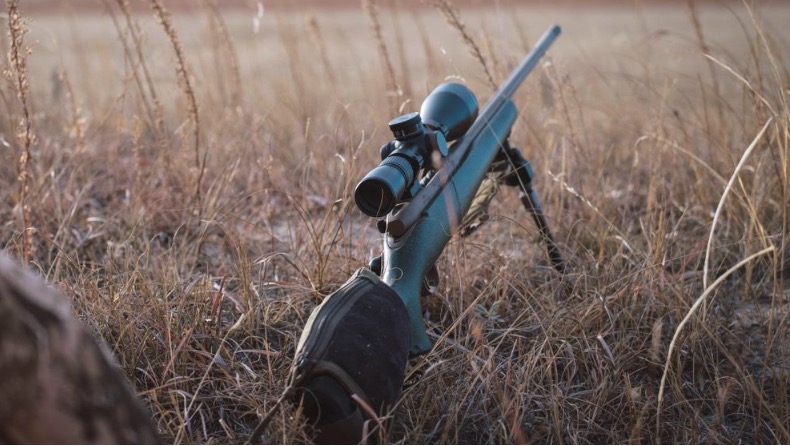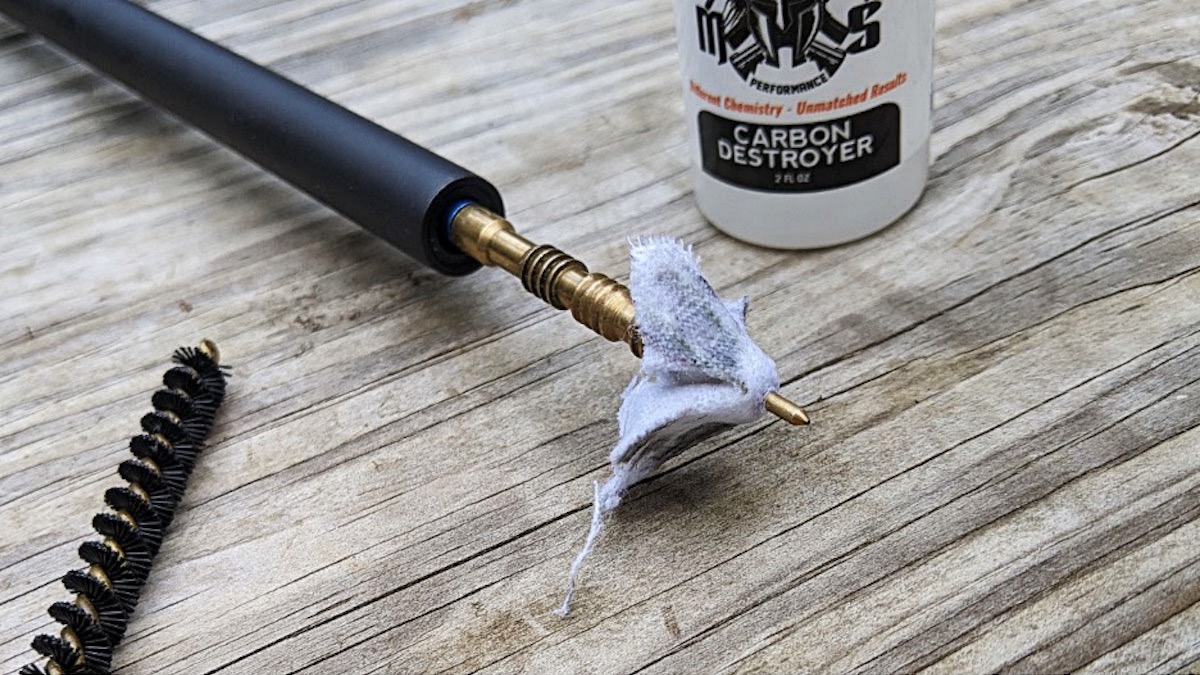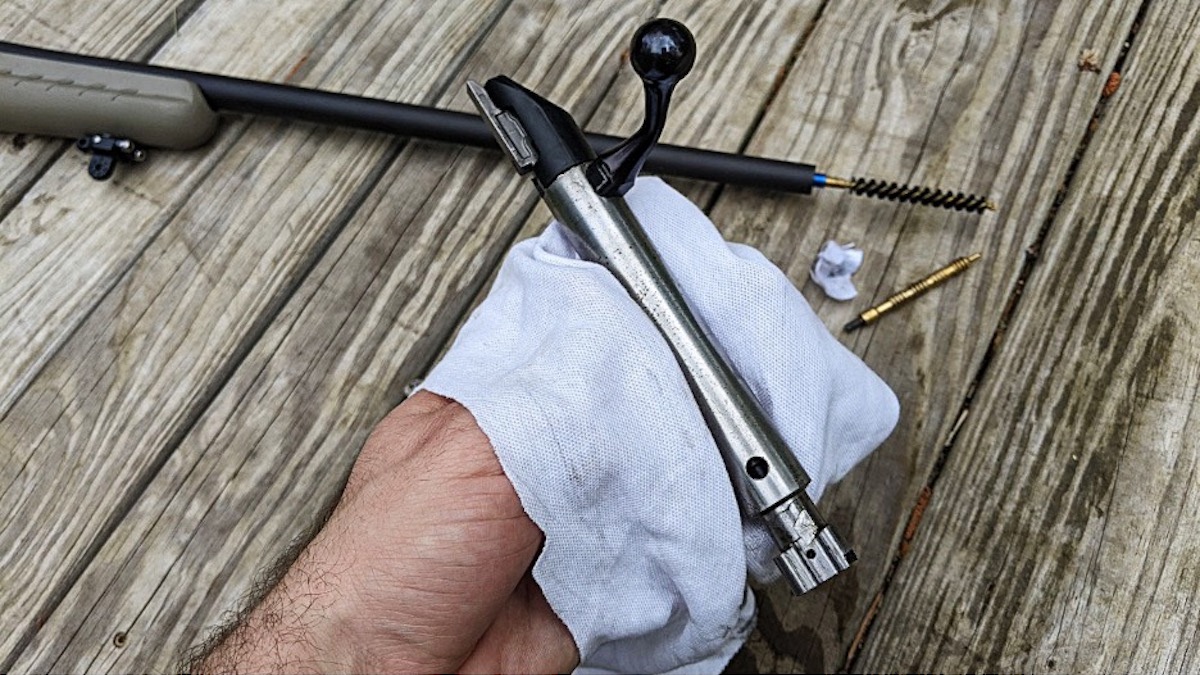
Ask ten different hunters how often they clean their guns, and you’re liable to get ten different answers–and start a fight while you’re at it. For such a mundane task, scraping the fouling from a gun’s barrel and action can stir up some serious emotion.
Asking the Internet doesn’t help much, either. This Quora thread on the topic features yelly, ALL CAPS responses, book-length answers, and odd references to genitalia. One respondent maintains that gun owners “fetishize” gun cleaning, while another describes the task as a “Zen experience.”
It’s impossible to say precisely how often you should clean your guns, but let’s try to cut through some of this fouling and get to the shiny truth of the matter. This advice focuses primarily on long guns but many of these principles can be applied to other types of firearms as well.

Accuracy Is Everything
I surveyed the MeatEater crew and reached out to some of the country’s largest gun manufacturers, and as expected, the advice I received landed all over the map. MeatEater’s Director of Hunt and Fish and a competitive shooter, Garrett Long, told me it’s usually a “long time” between cleanings.
“If you talk to Precision Rifle Series competitors, nearly all of them will tell you to clean it after about 1,000 rounds,” he said.
On the other end of the spectrum, Weatherby recommends cleaning your rifle after every single trip to the range or the field. They say that since a rifle can show signs of decreased accuracy after as few as 30 rounds, a gun should be cleaned around that point.
Despite these widely divergent recommendations, everyone I spoke with agreed that accuracy should be a key indicator of when it’s time to break out the CLP.
“Once you start seeing your accuracy open up, if I’m using the same or similar ammo, I always clean out my bore,” Rich Spalla told me. Spalla is the product manager for Sig Sauer’s CROSS bolt action rifle and an instructor at the Sig Sauer Academy.
When he brings a new rifle to the range for the first time, he begins by following the manufacturer’s break-in instructions, which often include cleaning at various intervals. After that, a barrel’s accuracy will likely improve with a small amount of fouling but then slowly degrade as the fouling builds up along the lands and grooves.
How much accuracy degrades depends on your specific gun and how you use it. If you’re a competitive shooter tracking minute changes in group sizes, you might clean it more often than a weekend warrior plinking at the range.
MeatEater’s Janis Putelis uses accuracy as a guide and finds that he doesn’t need to clean his rifles as often as he used to.
“I used to clean my guns a lot. Every 20 rounds,” he said. “But I soon realized that I wasn't gaining anything. My accuracy wouldn't improve with a clean gun and I wasn't hurting the gun by leaving the barrel dirty.”
Now, Putelis says he cleans his rifle’s barrels every 200 or 300 rounds. Spalla agreed that 200 to 250 rounds is a good rule of thumb.
There is one big caveat, Spalla said. It may take several years for some hunters to shoot through 300 rounds or for their rifle’s accuracy to begin to degrade. If that’s the case, he recommends cleaning the barrel at least once a year to avoid carbon corrosion.
“Having your barrel slightly coated with carbon isn’t always a bad thing, but if you left it in there for a year it could start chewing away at your gun,” he said.
Bottom line? Clean your rifle’s barrel when group sizes expand, or at least once a year.

Can Frequent Cleaning Damage a Barrel?
Some gun owners worry that cleaning a rifle too frequently will damage a bore faster than shooting it dirty. They claim that the harsh cleaning agents and copper wire brushes will wear down the lands and grooves and permanently damage accuracy.
I asked Spalla about this, and he said that frequent cleaning won’t damage most barrels as long as the user follows the instructions that come with the bore solvent. The most important thing is to remember to never leave a solvent inside a barrel longer than recommended.
“Solvent can definitely get into your bore if you let it sit in there,” he said. “It could cause corrosion and pitting. These chemicals are pretty harsh and could break down the composition of certain materials in a barrel.”
The Weatherby Service Team agreed. I posed this question to a representative of the company’s team of gunsmiths and technicians, and he said that most standard cleaning solutions should pose no issue if they are thoroughly removed with a few waves of clean patches at the end of the cleaning process.
As for the brush, most Weatherby gunsmiths prefer a nylon brush, but that’s only because copper brushes will degrade when using a copper remover. Copper brushes, they said, shouldn’t harm a barrel as long as the user follows the recommended procedure.

Don’t Forget about Moisture
So far, I’ve focused exclusively on barrel cleaning. But there are many other parts of a gun that need TLC. Even if you wait 500 rounds to clean a barrel, you should still make sure that rust isn’t eating away at other components.
“Rust prevention is my primary concern. Do whatever it takes to mitigate moisture accumulation,” said MeatEater’s Ryan Callaghan.
Callaghan told me that he “de-gunks” his gun’s bolt by hosing it down with Break Free CLP. He lets it dry, applies a small amount of oil or dry lube, and works that into action.
Long recommended cleaning non-barrel components frequently, and Putelis’s regular cleaning routine is focused “more on the outside of the gun than the inside of the barrel.”
“Most of my gun care happens after the gun has experienced heavy moisture. At the minimum, the gun will be wiped down and oiled, but preferably I'd take apart the action and make sure all moisture is wiped away. I'll also run a bore snake down the barrel to remove any moisture,” he said.
This is especially important for hunters, but anyone who takes a firearm outside should do a once-over before returning the safe queen to her throne. Moisture can accumulate even when it isn’t raining, so it’s always a good idea to field strip your rifle, wipe it down with Break Free or a similar product, and apply a light layer of oil.
If you’re running a semi-automatic rifle, it’s even more important to make sure the non-barrel components are clean and properly oiled. A gunky bolt-action rifle can still be cycled with a little elbow grease, but a dirty autoloader will go down for the count. Even though constant cleaning may not be strictly necessary, it’s crucial that these types of actions aren’t allowed to get too dirty.
Barrels can also suffer from moisture accumulation. Even if you don’t do a thorough bore cleaning, Spalla recommended running an oiled patch through the barrel after hunting or shooting.
“You spend a lot of money on a gun, and the most important part of that gun is your rifle barrel,” he said. “If I’m going to store it for any period of time, I slap an oily patch down it.”

Last Shot
Cleaning your guns not only keeps them in good condition. It can also make you a more proficient shooter and hunter.
“When you’re cleaning a firearm, you’re looking for anything that could be wrong, and you’re understanding better how it works. What it looks like when it’s clean or dirty or pitted. Those are good things to learn and understand,” Spalla pointed out. “You become a better shooter and a better hunter when you handle your equipment, which will help you yield the best results.”
Clean your barrel when accuracy starts to degrade or once a year, and clean the other components after every trip to the range. Above all else, make sure you wipe away moisture from both outside and inside the gun. If you stick to those three rules of thumb, your gun will stay accurate and functioning as long as you own it.
For a breakdown of some of our favorite cleaning products, check out this article.




